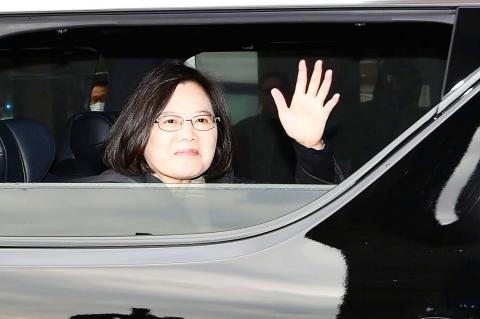President-elect Tsai Ing-wen (蔡英文) of the Democratic Progressive Party (DPP) should come out in support of the so-called “1992 consensus” during her inaugural address, panelists at discussions organized by the Taiwan Competitiveness Forum said yesterday in Taipei.
“The current state of affairs is that voters should be willing to make allowances for what the DPP does, so we hope that Tsai will use this to break through a lot of barriers, including the ‘1992 consensus,’” forum chairman Hsieh Ming-hui (謝明輝) said. “While for the Chinese Nationalist Party [KMT], recognition of the consensus was probably viewed as ‘selling out the nation,’ for Tsai to recognize it would be viewed as being for the good of the country.”
The “1992 consensus” refers to a supposed understanding reached during cross-strait talks in 1992 that Taiwan and China acknowledge that there is “one China,” with each side having its own interpretation of what that means. Former KMT lawmaker Su Chi (蘇起) in 2006 said that he had made up the term in 2000, when he was head of the Mainland Affairs Council, before the KMT handed power to the DPP.

Photo: Fang Pin-chao, Taipei Times
Hsieh’s call was echoed by numerous members of the panel of “pan-blue” academics and commentators.
“If Tsai does not acknowledge the ‘1992 consensus,’ then she has to be prepared to deal with an earthquake,” Taiwan Institute of Economic Research board member and former KMT lawmaker Chiu Yi (邱毅) said. “After the excitement of the election is over, you have to face the problems of reality.”
He predicted a range of Chinese sanctions could be imposed after Tsai takes office, including reductions in the number of Chinese tourists and imports of Taiwanese agricultural products, a foreign relations “avalanche” that would see Taiwan’s diplomatic allies picked off by China.
During President Ma Ying-jeou’s (馬英九) terms in office, Beijing has refrained from trying to lure Taiwan’s allies from switching recognition.
Former People First Party legislator Pang Chien-kuo (龐建國), a professor at the Chinese Culture University’s Graduate Institute of National Development and Mainland China, said that Tsai’s economic proposals have failed to take Chinese influence into account.
Even if Tsai is not forced to agree to recognize the “1992 consensus,” acknowledging that there is “one China” is likely to be the premise for any negotiations with Beijing, Pang said.
However, DPP Legislator Huang Wei-cher (黃偉哲) said that Tsai has moved the DPP’s rhetoric toward the center of the political spectrum by promising to “maintain the ‘status quo,’” even though the goal of Taiwan independence remains enshrined in the DPP’s charter.
“In the past, the Ma administration mainly talked about ‘one China,’ with only Taiwan maintaining that there were ‘different interpretations’ — is this logic really acceptable to Taiwanese?” Huang asked.
“In reality, the will of the people was shown with the election results — demonstrating that the KMT’s logic and position have been rejected. Given this, we hope that there will be a way to express the public’s will as both sides of the Taiwan Strait adjust and get to know each other,” he said.

Several Chinese Nationalist Party (KMT) officials including Chairman Eric Chu (朱立倫) are to be summoned for questioning and then transferred to prosecutors for holding an illegal assembly in Taipei last night, the Taipei Police said today. Chu and two others hosted an illegal assembly and are to be requested to explain their actions, the Taipei City Police Department's Zhongzheng (中正) First Precinct said, referring to a protest held after Huang Lu Chin-ju (黃呂錦茹), KMT Taipei's chapter director, and several other KMT staffers were questioned for alleged signature forgery in recall petitions against Democratic Progressive Party (DPP) legislators. Taipei prosecutors had filed

Taiwan would welcome the return of Honduras as a diplomatic ally if its next president decides to make such a move, Minister of Foreign Affairs Lin Chia-lung (林佳龍) said yesterday. “Of course, we would welcome Honduras if they want to restore diplomatic ties with Taiwan after their elections,” Lin said at a meeting of the legislature’s Foreign Affairs and National Defense Committee, when asked to comment on statements made by two of the three Honduran presidential candidates during the presidential campaign in the Central American country. Taiwan is paying close attention to the region as a whole in the wake of a

NEW WORLD: Taiwan is pursuing innovative approaches to international relations through economics, trade and values-based diplomacy, the foreign minister said Taiwan would implement a “three-chain strategy” that promotes democratic values in response to US tariffs, Minister of Foreign Affairs Lin Chia-lung (林佳龍) said. Taiwan would aim to create a “global democratic value chain,” seek to capitalize on its position within the first island chain and promote a “non-red supply chain,” Lin was quoted as saying in the ministry’s written report to the Legislative Yuan submitted ahead of the legislature’s Foreign Affairs and National Defense Committee meeting slated for today. The Ministry would also uphold a spirit of mutual beneficial collaboration, maintaining close communication and consultations with Washington to show that Taiwan-US cooperation

Taiwan and the US have begun trade negotiations over tariffs imposed by US President Donald Trump earlier this month, Minister of Foreign Affairs Lin Chia-lung (林佳龍) said in an interview this morning before reporting to the Legislative Yuan’s Foreign Affairs and National Defense Committee. The Taipei Economic and Cultural Representative Office (TECRO), Taiwan’s de facto embassy in the US, has already established communication channels with the US Department of State and the US Trade Representative (USTR), and is engaging in intensive consultations, he said. Points of negotiation include tariffs, non-tariff trade barriers and issues related to investment, procurement and export controls, he